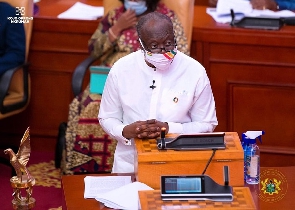 Ken Ofori-Atta, Finance Minister
Ken Ofori-Atta, Finance Minister
Government will today start the process for the issuance of seven-year treasury bonds with the opening of the book-build.
This follows the release of an initial pricing guidance for the bond issuance through the Ghana Stock Exchange, yesterday.
According to an announcement made by the Bank of Ghana on Friday, August 7, 2020, the Bonds will mature in 2027.
Per the government’s debt issuance calendar for June to August 2020, an amount of GHc 1,000 million in seven year bonds is expected to be issued this month. Of the GHc 17,837.87 million domestic debt securities to be issued during the three month period, GHc 5,987.87 million is planned for the month of August.
Each bond to be issued shall have a face value of GHc 1, with a minimum subscription of GHc 50,000 and multiples of GHc 1,000 thereafter. The offer will be opened to both local and foreign investors.
Books are expected to be closed midday on Thursday, around 2:30 pm, with the revised and final pricing determined.
Successful bids will be cleared at a single clearing level. However, in the event of oversubscription, there will be a discretionary allocation at the single clearing level. Investors are expected to be settled or issued with the bonds on Monday, August 17, 2020.
Per its issuance calendar, Government aims to build benchmark bonds through the issuance of the different instruments, including the seven-year bond through the book-building method.
The six-year bond would be issued through Absa, Databank, Fidelity Bank, IC Securities and Stanbic acting as book runners for government.
Government Debt Strategy
According to the 2020 mid-year budget statement, Government has revised its Debt Sustainability Analysis (DSA) conducted in 2019 in order to assess the impact of COVID-19 pandemic on revenues, expenditures, and financing in the medium to long-term.
The result of the 2020 COVID-19 DSA shows that Ghana’s debt distress from external and domestic sources remains unchanged from the results of the previous 2019 DSA which was sustainable but high. The shocks from the COVID-19 pandemic, resulting in fall in crude oil prices and decline in trade related revenues, are expected to deepen the current account and fiscal deficits over the medium-term, resulting in an elevated debt path compared to the pre-COVID-19 2020 DSA.
But fiscal costs, including those associated with the pandemic response and measures to support economic activity, as well as a more prolonged crisis, could have an even greater negative impact on debt sustainability.